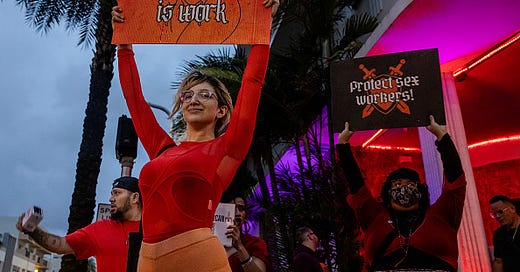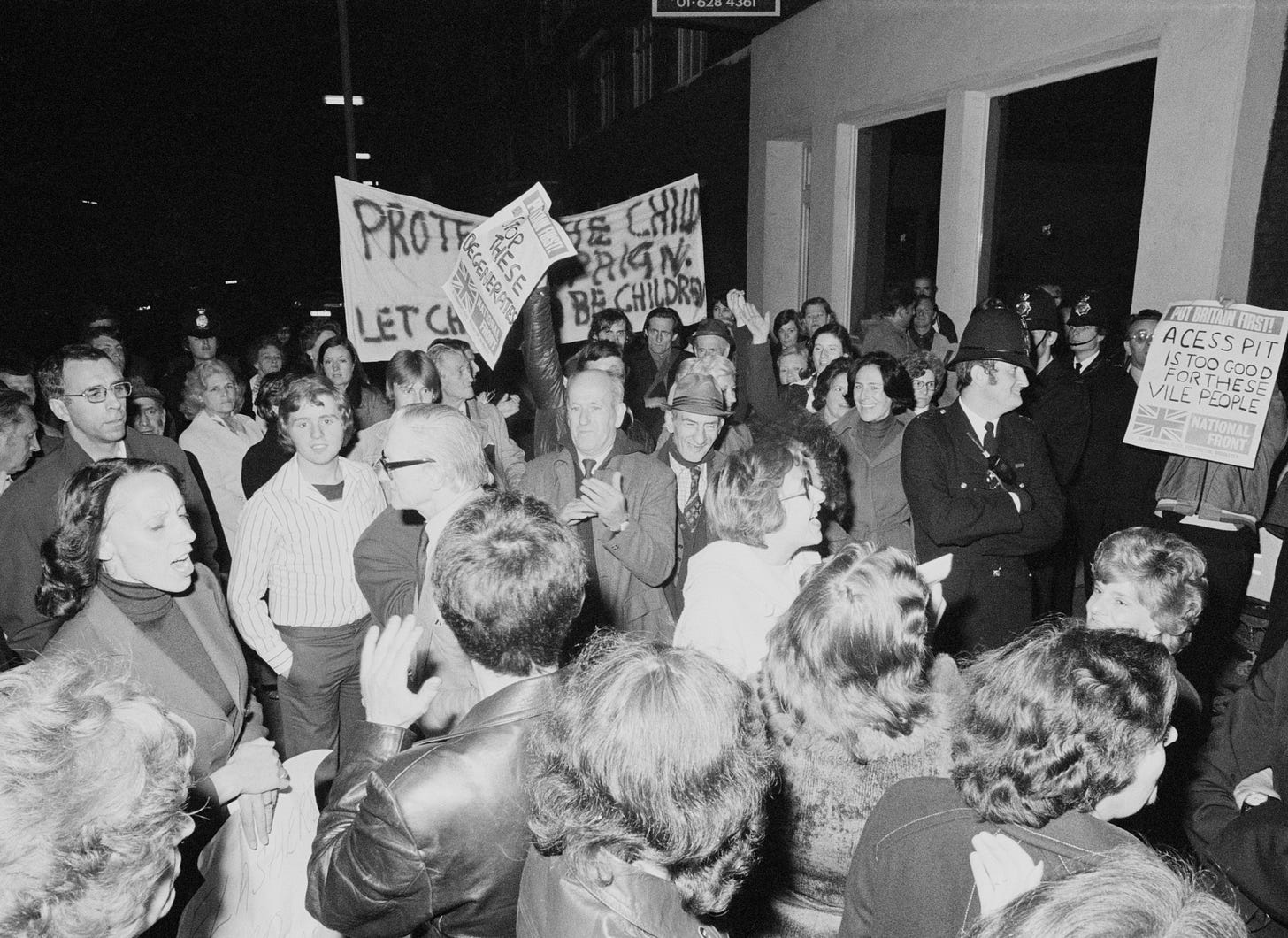Queering child abuse
How the LBBTQQIA2S+++++++++ movement promotes the prostitution of children under the guise of 'queer rights'
A version of this article is published in Al Jazeera, 30th August 2024
In recent decades, so-called ‘sex workers’ rights’ campaigns to decriminalise pimping and sex buying have attached themselves, limpet-like, to the lesbian and gay movement currently known as ‘LGBTQ+’. In many ways it makes sense for the pro-prostitution lobby to present itself as part of a proud social justice campaign, as it helps perpetuate the myth that prostitution is liberating.
I have, on numerous occasions, heard ‘sex work’ lobbyists compare the campaign to legalise pimping, brothel owning and sex buying with the successful 1967 campaign for the partial decriminalisation of homosexual acts. As a lesbian who has always been out and proud, this analogy is as offensive as it is duplicitous. Prostitution benefits men who wish to colonise women’s bodies, whereas being allowed to escape the shackles of compulsory heterosexuality is a matter of personal freedom to define one’s own sexuality.
Such arguments continue to rage today – especially in light of the institutional capture achieved by gender ideology across many state and non-state agencies.
The latest shocker comes via California, where LGBTQ+ activists have successfully mounted opposition to planned increased penalties for adults soliciting sex from prostituted children.
In April this year, Republican Senator Shannon Grove put forward her bill that would make soliciting a minor for sex, or agreeing to engage or engaging in any form of commercial sex with a child, a felony offence, with sex offender registration required in the event of repeat offending.
However, during the debate of the Public Safety Committee, Democrats pushed for a charge of misdemeanour (rather than full felony) for those aged 15 and under. But it also excluded 16- and 17-year-olds, unless it can be proven that they were trafficked into the sex trade – which is now the only route to criminalising the exploiters. “People that buy children for sex in the state of California should go to prison,” says Senator Grove.
As things currently stand in California, if a person solicits a minor (up to and including 16 and 17-year-olds) for prostitution, the penalty is up to one year in prison and and/or a $10,000 fine. Had it passed unamended, Senator Grove’s bill would have allowed judges to sentence up to two years in jail and issue a maximum fine of $25,000. These proposals are, incredibly, opposed by LGBTQ+ activists – who claim that increased penalties for those who abuse minors in caught up in the sex trade will affect the LGBTQ+ community ‘disproportionately’.
Opponents of the bill also argued that 16- and 17-year-olds should be exempted from the penalties, and that the punishment should be reduced from two years in prison to up to one year in county jail.
“We are particularly concerned that the harsher penalties proposed in this bill will disproportionately impact marginalised communities, especially members of the LGBTQ+ community, who already suffer from systematic biases within the criminal justice system, particularly when it comes to sexually based offenses,” argued Grove’s opponents while addressing the committee about the changes to the bill.
You might think that harsher penalties for soliciting minors for prostitution should be a no-brainer, but these activists argue:
“Studies have shown that LGBTQ+ people, particularly gay and transgendered individuals, are more likely to be charged with sex offenses compared to their heterosexual counterparts”. They go on to state that ‘LGBTQ+ individuals’ are nine times more likely to be charged with sex crimes, and are thus more likely to be incarcerated – which will in turn lead to increased difficulties in finding housing and employment. Why on earth should an exception be made for LGBTQ+-identified abusers? Could it be because the sexual exploitation of children and young people is often considered a legitimate avenue of pleasure for men who adopt the ‘queer’ label?
Who would have thought that in the state of California, it would be this difficult to protect minors aged 17 and under from men wanting to purchase them for sex?
Prosecutors in California admit that – given the preconditions for prosecuting someone who is soliciting sex from 16 and 17 year olds – it will be almost impossible to bring a case; there are simply too many hoops to jump through.
In my view, if the California LGBTQ++ community is claiming that banning people from paying for underage sex is going to disproportionately affect them, then this is in itself a fairly damning admission.
I come across these arguments constantly, where prostitution (framed as ‘sex work’) is seen as a sexual identity rather than abuse of the most vulnerable, including underage children. The argument is that since prostitution is almost an integral part of gay male culture, the police are bound to use this to entrap ‘queer people’.
The so-called ‘Progress Flag’ currently includes a stripe for ‘sex work liberation’; this needs to be removed. The arguments around prostitution are in urgent need of reframing so that we can see prostitution for what it really is: the oldest oppression. When decriminalised prostitution policies are being advocated in the name of lesbians and gay men, something has gone terribly wrong with the lesbian and gay rights movement.
Accusations of ‘whorephobia’ (which implies the hatred or stigmatisation of prostituted women and men) are used to silence and deter any criticism whatsoever of the sex trade. This viewpoint (which is enshrined in universities’ ‘safe space’ policies) has (mis)led some lesbian and gay students into adopting a ‘queer’ identity.
Peter Tatchell is a gay rights activist who has long campaigned for lowering the age of consent for all to 14. In the early 1990s, he reviewed a grotesque and shocking book, Dares to Speak: Historical & Contemporary Perspectives On Boy-Love (edited by Joseph Geraci). Tatchell wrote: ‘Abusive, exploitative relationships are indefensible but ... [there are] many examples of societies where consenting intergenerational sex is considered normal, acceptable, beneficial and enjoyable by old and young alike’.
In a blog post, Tatchell also wrote:
“Lee is 14. He’s been having sex with boys since the age of eight, and with men since he was 12. Lee has a serious problem. He wants a steady relationship and has been going out recently with a guy in his mid-20s, who he met at the hairdressers. But in the eyes of the law, Lee’s partner is a paedophile and Lee is a victim of child abuse. That’s not, however, the way Lee sees it: ‘I want to have a boyfriend. It’s my choice. No one’s abusing me. Why should we be treated like criminals?’”
‘Queer’ campaigners, including a number of academics, have helped to pimp prostitution in a bid to sanitise – and conceal the reality of – the sex trade.
Transwoman Janet Mock is a male-to-female transgender activist whose memoir about growing up transgender, Redefining Realness: My Path to Womanhood, Identity, Love & So Much More appears to celebrate children’s involvement in the sex trade:
“I was 15 the first time I visited Merchant Street, what some would call ‘the stroll’ for trans women involved in street-based sex work. At the time, I had just begun medically transitioning and it was where younger girls, like my friends and myself, would go to hang out, flirt and fool around with guys, and socialise with older trans women, the legends of our community.”
The Democrats in California that argued for less punitive penalties for those that target prostituted minors are, by default, suggesting that child prostitution is a ‘queer’ sexual identity. It also gives the clear impression that the men within the so-called LGBTQ+ ‘community’ should be given special dispensation. However it is dressed up, this is nothing more than child abuse apologism.








I think I figured it out, the whole thing, and can express it in a few sentences:
A. If it satisfies some men's sexual pleasure, it should be legal, or
B. If it allows some men to indulge in whatever sexual fetishes they want, it should be legal, or
C. If it empowers some men to greater control over, and access to, women, it should be legal, or
D. If it in any way restricts or limits the above three principles, it is an oppressive violation of freedom of expression and therefore unconstitutional.
Thank you, queer movement, you've made our legal system much simpler and easier to understand.
“have attached themselves, limpet-like” is a brilliantly apt turn of phrase! I wonder whether anyone credible has teased out stats by individual alphabet letter to demonstrate to whom exactly the claim applies that “Studies have shown that LGBTQ+ people, particularly gay and transgendered individuals, are more likely to be charged with sex offenses compared to their heterosexual counterparts.” Dollars to donuts, it is not the L’s to whom these stats apply. Time to call in the Lesbian Limpet Removal Brigade!